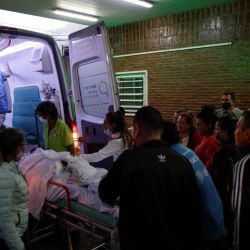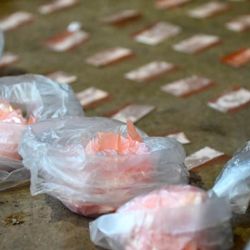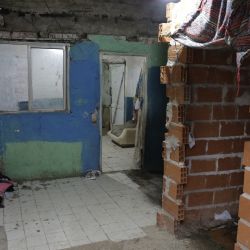Some 80 young people hospitalised, 24 of them dead within hours from cocaine laced with carfentanil, a potent veterinary anaesthetic used on elephants and other large animals.
One year ago, the so-called ‘laced cocaine’ tragedy horrified Argentina. But 12 months on, survivors feel abandoned, court proceedings have all-but fizzled out and the state is struggling to prevent a repeat episode.
"There was no [official] help at all. At that moment, only the police came and that was the end of it," says Mónica Barco, mother of 23-year-old Cristian, one of the survivors of the tragedy.
Mónica breaks down in tears. Her son's condition has been aggravated by his use of a cheap, addictive drug known as 'paco,' (cocaine-base paste).
The Puerta 8 case – a reference to name of the poor neighbourhood on the outskirts of Buenos Aires where cocaine laced with the synthetic opioid carfentanil, a substance much more potent than fentanyl and heroin, was sold – "is the paradigm of the failure of public policies on consumption and drug-trafficking," said Mónica Cuñarro, a federal prosecutor for cases involving complex crimes and drugs.
Between February 1 and 2, 2022, some 80 people in very serious condition were treated for the opioid in Buenos Aires and its outskirts. Nobody knew how much of the drug adulterated with carfentanil was still circulating on the streets, and authorities made urgent appeals to addicts to discard what they had.
Police arrested a dozen dealers, but none could be charged. Only 11 of the 24 deaths were prosecuted.
In March, a court in San Martín, Buenos Aires Province, cleared a gang already being investigated by police at Puerta 8 of the 2022 deaths – but not the trafficking.
In October, an appeals court did the same for the five defendants, all street dealers of the laced cocaine. However, it was "not proven" that the defendants knew the cocaine was cut with carfentanil, and the court ruled on what it called a "novel combination of drugs" to "expand supply."
Argentina today is a consolidated "transit country" for illegal drugs, Cuñarro explains.
"What leaves the country is of good quality. What is left goes to the domestic market, is of low quality and is consumed by the popular sectors," she added.
Growing trend
In Argentina, cocaine has "always" been laced – to make it cheaper – down to around 25 percent purity, says toxicologist Carlos Damín at the Hospital Fernández in Buenos Aires.
However, in the past year, no new carfentanil-laced cuttings have been detected, according to the authorities.
According to the latest national drug statistics for 2017, 5.3 percent of the Argentine population has tried cocaine. While an eighth survey is being processed, the secretary of Comprehensive Drug Policies, Gabriela Torres, anticipated that "in general, the trend of consumption has been rising."
The country has hotspots, such as violence-ridden Rosario. With a population of 1.3 million, of whom 31.2 percent are below the poverty line, the city registered a record 288 murders linked to drug-trafficking in 2022, according to a local public security observatory.
The national government announced that it will relaunch an Early Warning System created in 2016 and which, since 2020, has increased the number of public assistance devices for addicts from 300 to more than 800.
"It is not a problem of individual will, we need society to ask itself how we want to live in relation to consumption" in general, not just drugs, Torres said.
Damín stressed that in Argentina there is a basic health approach to intoxication and drug abuse but there is a lack of "prevention based on the promotion of healthy habits on a massive scale."
"The problematic consumption of substances crosses all social classes," Damín said, recalling the case of a rave party in 2016 in Buenos Aires, in which five young people from the middle and upper classes died from drug use.
And just days ago, in Santa Fe, new serious cases of poisoning due to consumption of cocaine laced with a veterinary antiparasitic substance were reported.
"We haven't learned anything. Or we have not wanted to. No measure was implemented with which we can avoid" another case like the one in 2022, Gustavo Zbuczinsky, head of the Damage Reduction Association (ARDA) NGO, told AFP.
–– TIMES/AFP
related news
by Eduardo De Miguel, AFP





























Comments